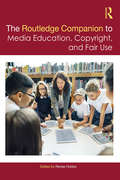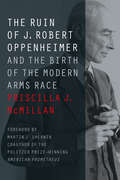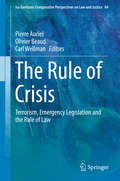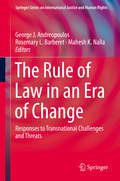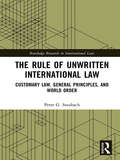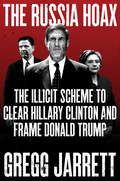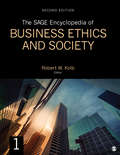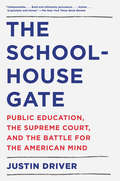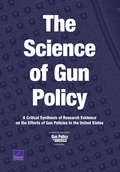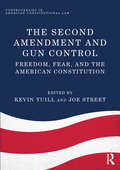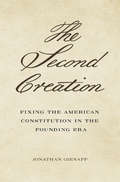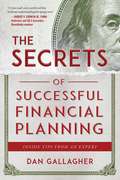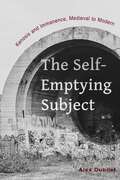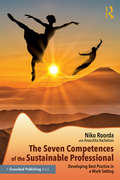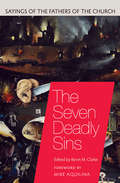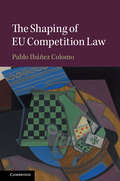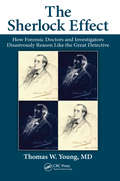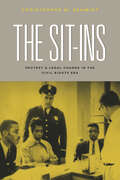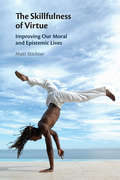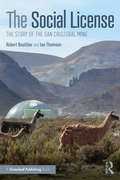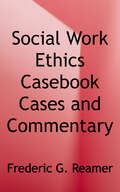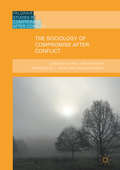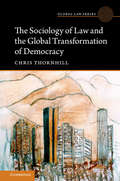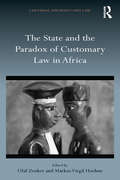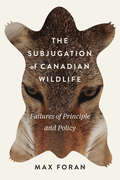- Table View
- List View
The Routledge Companion to Media Education, Copyright, and Fair Use (Routledge Media and Cultural Studies Companions)
by Renee HobbsMedia literacy educators rely on the ability to make use of copyrighted materials from mass media, digital media and popular culture for both analysis and production activities. Whether they work in higher education, elementary and secondary schools, or in informal learning settings in libraries, community and non-profit organizations, educators know that the practice of media literacy depends on a robust interpretation of copyright and fair use. With chapters written by leading scholars and practitioners from the fields of media studies, education, writing and rhetoric, law and society, library and information studies, and the digital humanities, this companion provides a scholarly and professional context for understanding the ways in which new conceptualizations of copyright and fair use are shaping the pedagogical practices of media literacy.
The Ruin of J. Robert Oppenheimer: And the Birth of the Modern Arms Race (Johns Hopkins Nuclear History and Contemporary Affairs)
by Priscilla J. McMillanThis groundbreaking Cold War history reveals the government conspiracy to bring down America’s most famous scientist.On April 12, 1954, the nation was astonished to learn that J. Robert Oppenheimer was facing charges of violating national security. Could the man who led the effort to build the atom bomb really be a traitor? In this riveting book, Priscilla J. McMillan draws on newly declassified U.S. government documents and materials from Russia, as well as in-depth interviews, to expose the conspiracy that destroyed the director of the Manhattan Project.This meticulous narrative recreates the fraught years from 1949 to 1955 when Oppenheimer and a group of liberal scientists tried to head off the cabal of air force officials, anti-Communist politicians, and rival scientists, who were trying to seize control of U.S. policy and build ever more deadly nuclear weapons. Retelling the story of Oppenheimer’s trial, which took place in utmost secrecy, she describes how the government made up its own rules and violated many protections of the rule of law. McMilliam also argues that the effort to discredit Oppenheimer, occurring at the height of the McCarthy era and sanctioned by a misinformed President Eisenhower, was a watershed in the Cold War, poisoning American politics for decades and creating dangers that haunt us today.
The Rule of Crisis: Terrorism, Emergency Legislation And The Rule Of Law (Ius Gentium: Comparative Perspectives on Law and Justice #64)
by Carl Wellman Pierre Auriel Olivier BeaudThis book analyzes emergency legislations formed in response to terrorism. In recognition that different countries, with different legal traditions, have different solutions, it adopts a comparative point of view. The countries profiled include America, France, Israel, Poland, Germany and United Kingdom. The goal is not to offer judgment on one response or the other. Rather, the contributors offer a comprehensive and thoughtful examination of the entire concept. In the process, they draw attention to the inadaptability of traditional legal and philosophical categories in a new and changing political world. The contributors first criticize the idea of these legislations. They then go on to develop different models to respond to these crises. They build a general analytical framework by answering such questions as: What is an emergency legislation? What kinds of emergencies justify laws of this nature? Why is contemporary terrorism such a specific emergency justifying new laws? Using legal and philosophical reflections, this study looks at how we are changing society. Coverage also provides historical experiences of emergency legislations to further illustrate this point. In the end, readers will gain insight into the long-term consequences of these legislations and how they modify the very work of the rule of law.
The Rule of Law in an Era of Change: Responses to Transnational Challenges and Threats (Springer Series on International Justice and Human Rights)
by George J. Andreopoulos Rosemary L. Barberet Mahesh K. NallaThis forward-thinking volume examines the rule of law from a global perspective, in the context of a growing array of transnational challenges and threats As the United Nations (UN) notes, the rule of law constitutes the basis “on which fair and just societies are built.” The contributions to this volume provide insights to several emerging debates about what the rule of law means in the modern era of warfare and of massive and systematic human rights violations that call for robust and transparent accountability mechanisms and processes. The authors of this work examine several controversial topics, including: -The growing use of drones, and the morality of long distance use -The UN Security Council’s evolving counterterrorism policies and practices -Victims’ Rights and the effort to provide meaning and justice to victims and survivors of terrorism - The relationship between the International Criminal Court (ICC) and Truth and Reconciliation Commissions (TRCs) -The effectiveness of the international criminal justice process overall, with an eye to procedural fairness and justice. This timely work will be of interest to researchers in criminal justice, particularly with a focus on counter-terrorism and international justice, as well as international law, human rights, and international studies.
The Rule of Unwritten International Law: Customary Law, General Principles, and World Order (Routledge Research in International Law)
by Peter G. StaubachThis book seeks to re-appreciate the concept of customary international law as a form of spontaneous societal self-organisation, and to develop the methodological consequences that ensue from this conception for the practice of its application. In pursuing this aim, the author draws from three different strands of scholarship that have not yet been considered in connection with one another: First, general jurisprudential theories of customary law; second, theories of customary international law, especially as they relate to international relations scholarship; and third, methodological approaches to the interpretation of international law. This expansive, philosophical layout of the book enables the author to put the conceptual enigmas of customary international law into a broader perspective. Among the issues discussed in the book are the dichotomy of its traditional and modern forms and the respective benefits and disadvantages of inductive and deductive approaches to its ascertainment. In the course of this analysis, the author draws insights from Friedrich August Hayek’s theory of law as a ‘spontaneous order’, an information-processing device which enables the participants of a legal system to make use of decentralised knowledge. The book argues that the major advantage of custom as a source of international law lies in the fact that it is the result of a gradual process of trial and error, rather than the product of deliberate planning. This makes it a particularly apposite source of law in a time of seismic shifts in the distribution of power within a vastly diverse community of States, when a new global order is expected to emerge, the contours of which are not yet clearly discernible. This book applies general concepts of legal philosophy to explain the continuing relevance of custom as a source of international law while at the same time inferring from this theoretical framework concrete practical and methodological consequences, the most important of which is the special role that purposive interpretation plays with respect to rules of international custom. Given this broad approach, the book will be of interest to several groups of potential readers including academics interested in the philosophy of customary law in general, academic international lawyers and legal practitioners, especially judges, scholars of international relations and all those interested in how the international community of States organises itself.
The Russia Hoax: The Illicit Scheme to Clear Hillary Clinton and Frame Donald Trump
by Gregg JarrettFox News legal analyst Gregg Jarrett reveals the real story behind Hillary Clinton’s deep state collaborators in government and exposes their nefarious actions during and after the 2016 election. <P><P>The Russia Hoax reveals how persons within the FBI and Barack Obama’s Justice Department worked improperly to help elect Hillary Clinton and defeat Donald Trump in the 2016 presidential election. <P><P>When this suspected effort failed, those same people appear to have pursued a contrived investigation of President Trump in an attempt to undo the election results and remove him as president. <P><P>The evidence suggests that partisans within the FBI and the Department of Justice, driven by personal animus and a misplaced sense of political righteousness, surreptitiously acted to subvert electoral democracy in our country. <P><P>The book will examine: <P><P>How did Hillary Clinton manage to escape prosecution despite compelling evidence she violated the law? <P><P>Did Peter Strzok, James Comey, Andrew McCabe, Loretta Lynch, and others obstruct justice by protecting Clinton? <P><P>Why was there never a legitimate criminal investigation of Clinton in the Uranium One case?Are the text messages exchanged between Strzok and FBI lawyer Lisa Page evidence of a concerted effort to undermine the electoral process? <P><P>Was there ever any real evidence of "collusion" between Trump and the Russians? <P><P>Did Trump obstruct justice in the firing of Comey or was he legally exercising his constitutional authority? <P><P>Did the FBI and DOJ improperly use a discredited "dossier" about Trump to obtain a FISA warrant to spy on Trump associates? <P><P>Should Muller have disqualified himself under the special counsel law based on glaring conflicts of interest? <P><P>Was fired National Security Adviser Michael Flynn unfairly charged with making a false statement? <P><P>With insightful analysis and a fact-filled narrative, The Russia Hoax delves deeply into Democrat wrongdoing. <P><b>A New York Times Bestseller</b>
The SAGE Encyclopedia of Business Ethics and Society
by Robert W. KolbThoroughly revised, updated, and expanded, The SAGE Encyclopedia of Business Ethics and Society, Second Edition explores current topics, such as mass social media, cookies, and cyber-attacks, as well as traditional issues including accounting, discrimination, environmental concerns, and management. The new edition also includes an in-depth examination of current and recent ethical affairs, such as the dangerous work environments of off-shore factories for Western retailers, the negligence resulting in the 2010 BP oil spill, the gender wage gap, the minimum wage debate and increasing income disparity and the unparalleled level of debt in the U.S. and other countries with the challenges it presents to many societies and the considerable impact on the ethics of intergenerational wealth transfers. Key Features Include: Seven volumes, available in both electronic and print formats, contain more than 1,200 signed entries by significant figures in the field Cross-references and suggestions for further readings to guide students to in-depth resources Thematic Reader's Guide groups related entries by general topics Index allows for thorough browse-and-search capabilities in the electronic edition
The Schoolhouse Gate: Public Education, the Supreme Court, and the Battle for the American Mind
by Justin DriverAn award-winning constitutional law scholar at the University of Chicago (who clerked for Judge Merrick B. Garland, Justice Stephen Breyer, and Justice Sandra Day O’Connor) gives us an engaging and alarming book that aims to vindicate the rights of public school students, which have so often been undermined by the Supreme Court in recent decades. <P><P>Judicial decisions assessing the constitutional rights of students in the nation’s public schools have consistently generated bitter controversy. From racial segregation to unauthorized immigration, from antiwar protests to compulsory flag salutes, from economic inequality to teacher-led prayer—these are but a few of the cultural anxieties dividing American society that the Supreme Court has addressed in elementary and secondary schools. The Schoolhouse Gate gives a fresh, lucid, and provocative account of the historic legal battles waged over education and illuminates contemporary disputes that continue to fracture the nation. <P><P>Justin Driver maintains that since the 1970s the Supreme Court has regularly abdicated its responsibility for protecting students’ constitutional rights and risked transforming public schools into Constitution-free zones. Students deriving lessons about citizenship from the Court’s decisions in recent decades would conclude that the following actions taken by educators pass constitutional muster: inflicting severe corporal punishment on students without any procedural protections, searching students and their possessions without probable cause in bids to uncover violations of school rules, random drug testing of students who are not suspected of wrongdoing, and suppressing student speech for the viewpoint it espouses. <P><P>Taking their cue from such decisions, lower courts have upheld a wide array of dubious school actions, including degrading strip searches, repressive dress codes, draconian “zero tolerance” disciplinary policies, and severe restrictions on off-campus speech. <P><P>Driver surveys this legal landscape with eloquence, highlights the gripping personal narratives behind landmark clashes, and warns that the repeated failure to honor students’ rights threatens our basic constitutional order. This magisterial book will make it impossible to view American schools—or America itself—in the same way again.
The Science of Gun Policy: A Critical Synthesis of Research Evidence on the Effects of Gun Policies in the United States
by RAND CorporationThis report synthesizes the available scientific evidence on the effects of various firearm policies on firearm deaths, violent crime, the gun industry, participation in hunting and sport shooting, and other outcomes. Based on this synthesis, the authors highlight policies whose effects are better supported by evidence and areas where more and better information could contribute to establishing fair and effective gun policies.
The Second Amendment and Gun Control: Freedom, Fear, and the American Constitution (Controversies in American Constitutional Law)
by Kevin Yuill Joe StreetThe Second Amendment, by far the most controversial amendment to the US Constitution, will soon celebrate its 225th anniversary. Yet, despite the amount of ink spilled over this controversy, the debate continues on into the 21st century. Initially written with a view towards protecting the nascent nation from more powerful enemies and preventing the tyranny experienced during the final years of British rule, the Second Amendment has since become central to discussions about the balance between security and freedom. It features in election contests and informs cultural discussions about race and gender. This book seeks to broaden the discussion. It situates discussion about gun controls within contemporary debates about citizenship, culture, philosophy and foreign policy as well as in the more familiar terrain of politics and history. It features experts on the Constitution as well as chapters discussing the symbolic importance of Annie Oakley, the role of firearms in race, and filmic representations of armed Hispanic girl gangs. It asks about the morality of gun controls and of not imposing them. The collection presents a balanced view between those who favour more gun controls and those who would prefer fewer of them. It is infused with the belief that through honest and open debate the often bitter cultural divide on the Second Amendment can be overcome and real progress made. It contains a diverse range of perspectives including, uniquely, a European perspective on this most American of issues.
The Second Creation: Fixing the American Constitution in the Founding Era
by Jonathan GienappAmericans widely believe that the U.S. Constitution was almost wholly created when it was drafted in 1787 and ratified in 1788. Jonathan Gienapp recovers the unknown story of the Constitution’s second creation in the decade after its adoption—a story with explosive implications for current debates over constitutional originalism and interpretation.
The Secrets of Successful Financial Planning: Inside Tips from an Expert
by Dan GallagherThere are six interrelated segments to a complete financial plan: Cash & Budget Planning, Insurance & Risk Management, Tax Management, Retirement Planning, Investment Planning, and Estate Planning. What aspects of the financial plan require sophisticated planning by a professional, and what can savvy, well-educated consumers handle themselves? The Secrets of Successful Financial Planning empowers readers to take charge of their financial present and future, regardless of where they are financially, by presenting technical jargon in a way that’s easy to understand. This book touts several unique and rare reader benefits:Written for DIYers and those needing to select or understand advisorsUseful for new savers up to mid-retirees30 dramatic true stores of client triumphs and tragedies—no dull case studiesUnbiased perspective is neither insurance nor investment skewed, and provides industry secretsAccess via author website to customizable spreadsheets and moreHere is sage advice and insider information known to the very few. For example, consumers buy more long-term care insurance then they need because their advisors are forbidden to show them alternative or supplemental strategies. They buy one large life policy when best-practice analysis usually would find need for two smaller, distinctive types. They get recommendations for annuity, insurance, and investment replacement, but how can they be certain the answers they get are unbiased? Author Dan Gallagher provides advice and counsel that will help readers set the stage for financial security for themselves and their families. He shares what you can do yourself and when you need a pro’s help.
The Self-Emptying Subject: Kenosis and Immanence, Medieval to Modern
by Alex DubiletAgainst the two dominant ethical paradigms of continental philosophy–Emmanuel Levinas’s ethics of the Other and Michel Foucault’s ethics of self-cultivation—The Self-Emptying Subject theorizes an ethics of self-emptying, or kenosis, that reveals the immanence of an impersonal and dispossessed life “without a why.” Rather than aligning immanence with the enclosures of the subject, The Self-Emptying Subject engages the history of Christian mystical theology, modern philosophy, and contemporary theories of the subject to rethink immanence as what precedes and exceeds the very difference between the (human) self and the (divine) other, between the subject and transcendence. By arguing that transcendence operates and subjects life in secular no less than in religious domains, this book challenges the dominant distribution of concepts in contemporary theoretical discourse, which insists on associating transcendence exclusively with religion and theology and immanence exclusively with modern secularity and philosophy.The Self-Emptying Subject argues that it is important to resist framing the relationship between medieval theology and modern philosophy as a transition from the affirmation of divine transcendence to the establishment of autonomous subjects. Through an engagement with Meister Eckhart, G.W.F. Hegel, and Georges Bataille, it uncovers a medieval theological discourse that rejects the primacy of pious subjects and the transcendence of God (Eckhart); retrieves a modern philosophical discourse that critiques the creation of self-standing subjects through a speculative re-writing of the concepts of Christian theology (Hegel); and explores a discursive site that demonstrates the subjecting effects of transcendence across theological and philosophical operations and archives (Bataille). Taken together, these interpretations suggest that if we suspend the antagonistic relationship between theological and philosophical discourses, and decenter our periodizing assumptions and practices, we might encounter a yet unmapped theoretical fecundity of self-emptying that frees life from transcendent powers that incessantly subject it for their own ends.
The Seven Competences of the Sustainable Professional: Developing Best Practice in a Work Setting
by Niko Roorda Anouchka RachelsonThe Seven Competences of the Sustainable Professional shows how every professional can contribute to sustainable development. Through real-life stories told by a range of professionals, each illustrating a sustainability competence, this book provides a practical guide to help professionals realize their sustainability potential. Together, these competences form an accessible framework that is explained in practical terms. Readers are able to check their own sustainability competence level and make plans for personal development at each stage of the book. There are dozens of books explaining how companies and organizations should work decently, dealing with topics like corporate social responsibility (CSR), sustainable entrepreneurship, and corporate governance. There is an equally large number of books that describe how individuals should behave in their private lives, for instance, by buying healthy food, using energy-saving equipment, showering with less water, and switching off lights in empty rooms. However, this is the first book to provide individual professionals with a clear framework to enable them to act in a sustainable way in their workplace, be they the CEO, CFO, manager, or office worker.
The Seven Deadly Sins: Sayings of the Fathers of the Church (Sayings Of The Fathers Of The Church Ser.)
by Kevin M. Clarke&“Read this not just for intellectual enjoyment but to discover a centuries-old, proven path for conquering your worst sins&” (Brandon Vogt, author of Why I Am Catholic). Gluttony. Lust. Greed. Anger. Sloth. Envy. Pride. The capital vices are the gateway drugs to countless sins. But where did this tradition come from? Unsurprisingly, it can be traced back to the teachings of the Church Fathers, whose words—included in this book—answer such questions as: So how do the capital sins spawn other vices in the soul? How does one cultivate the virtues that heal the soul from those vices? How are gluttony and lust related? What role does almsgiving have in soothing the passion of anger? As the path of the book descends through the vices, the words of the Fathers will assist readers in being more realistic about the attacks upon the soul. Edifying and medicinal, each chapter begins with vice and ends with virtue, so one&’s path through the chapters represents a sort of ascent out of sin and on to the road to righteousness. The text gives special attention to the thoughts of Augustine of Hippo, Evagrius of Pontus, John Cassian, Gregory the Great, and Maximus the Confessor. &“An illuminating survey of the Church Fathers&’ wisdom on the capital vices that have burdened us since time immemorial.&” —Curtis A. Martin, Founder and CEO of FOCUS &“A wonderfully helpful compendium of insights and advice from the Church Fathers . . . You will be astonished at how relevant and applicable is this ancient wisdom to the life of the modern-day Christian. Highly recommended.&” —James Martin, SJ, author of Jesus: A Pilgrimage
The Shaping of EU Competition Law
by Pablo Ibáñez ColomoBased on a unique and comprehensive database, The Shaping of EU Competition Law combines qualitative and quantitative approaches to shed light on the evolution of EU competition law. It brings a new perspective to some of the most topical issues in the field including due process and the intensity of judicial review. The author's main purpose is to examine how the institutional structure influences the substance of EU competition law provisions. He seeks to identify patterns in the behaviour of the European Commission and the EU Courts and how they interact with each other. In particular, his analysis considers how the European Commission reacts to the case law and whether, and in what instances, the EU courts defer to the analysis of the administrative authority. The analysis is supported by the database and an unprecedented array of statistics and figures free to view online.
The Sherlock Effect: How Forensic Doctors and Investigators Disastrously Reason Like the Great Detective
by Thomas W. YoungForensic science is in crisis and at a cross-roads. Movies and television dramas depict forensic heroes with high-tech tools and dazzling intellects who—inside an hour, notwithstanding commercials—piece together past-event puzzles from crime scenes and autopsies. Likewise, Sherlock Holmes—the iconic fictional detective, and the invention of forensic doctor Sir Arthur Conan Doyle—is held up as a paragon of forensic and scientific inspiration—does not "reason forward" as most people do, but "reasons backwards." Put more plainly, rather than learning the train of events and seeing whether the resultant clues match those events, Holmes determines what happened in the past by looking at the clues. Impressive and infallible as this technique appears to be—it must be recognized that infallibility lies only in works of fiction. Reasoning backward does not work in real life: reality is far less tidy. In courtrooms everywhere, innocent people pay the price of life imitating art, of science following detective fiction. In particular, this book looks at the long and disastrous shadow cast by that icon of deductive reasoning, Sherlock Holmes. In The Sherlock Effect, author Dr. Thomas W. Young shows why this Sherlock-Holmes-style reasoning does not work and, furthermore, how it can—and has led—to wrongful convictions. Dr. Alan Moritz, one of the early pioneers of forensic pathology in the United States, warned his colleagues in the 1950’s about making the Sherlock Holmes error. Little did Moritz realize how widespread the problem would eventually become, involving physicians in all other specialties of medicine and not just forensic pathologists. Dr. Young traces back how this situation evolved, looking back over the history of forensic medicine, revealing the chilling degree to which forensic experts fail us every day. While Dr. Young did not want to be the one to write this book, he has felt compelled in the interest of science and truth. This book is measured, well-reasoned, accessible, insightful, and—above all—compelling. As such, it is a must-read treatise for forensic doctors, forensic practitioners and students, judges, lawyers adjudicating cases in court, and anyone with an interest in forensic science.
The Sit-Ins: Protest and Legal Change in the Civil Rights Era (Chicago Series in Law and Society)
by Christopher W. SchmidtOn February 1, 1960, four African American college students entered the Woolworth department store in Greensboro, North Carolina, and sat down at the lunch counter. This lunch counter, like most in the American South, refused to serve black customers. The four students remained in their seats until the store closed. In the following days, they returned, joined by growing numbers of fellow students. These “sit-in” demonstrations soon spread to other southern cities, drawing in thousands of students and coalescing into a protest movement that would transform the struggle for racial equality. The Sit-Ins tells the story of the student lunch counter protests and the national debate they sparked over the meaning of the constitutional right of all Americans to equal protection of the law. Christopher W. Schmidt describes how behind the now-iconic scenes of African American college students sitting in quiet defiance at “whites only” lunch counters lies a series of underappreciated legal dilemmas—about the meaning of the Constitution, the capacity of legal institutions to remedy different forms of injustice, and the relationship between legal reform and social change. The students’ actions initiated a national conversation over whether the Constitution’s equal protection clause extended to the activities of private businesses that served the general public. The courts, the traditional focal point for accounts of constitutional disputes, played an important but ultimately secondary role in this story. The great victory of the sit-in movement came not in the Supreme Court, but in Congress, with the passage of the Civil Rights Act of 1964, landmark legislation that recognized the right African American students had claimed for themselves four years earlier. The Sit-Ins invites a broader understanding of how Americans contest and construct the meaning of their Constitution.
The Skillfulness of Virtue: Improving our Moral and Epistemic Lives
by Matt StichterThe Skillfulness of Virtue provides a new framework for understanding virtue as a skill, based on psychological research on self-regulation and expertise. Matt Stichter lays the foundations of his argument by bringing together theories of self-regulation and skill acquisition, which he then uses as grounds to discuss virtue development as a process of skill acquisition. This account of virtue as skill has important implications for debates about virtue in both virtue ethics and virtue epistemology. Furthermore, it engages seriously with criticisms of virtue theory that arise in moral psychology, as psychological experiments reveal that there are many obstacles to acting and thinking well, even for those with the best of intentions. Stichter draws on self-regulation strategies and examples of deliberate practice in skill acquisition to show how we can overcome some of these obstacles, and become more skillful in our moral and epistemic virtues.
The Social License: The Story of the San Cristobal Mine
by Ian Thomson Robert BoutilierThis unique book combines a colourful history of Bolivian politics with some of the most advanced quantitative techniques yet developed for socio-political risk analysis. This is the story of how a foreign-owned private sector mining company (Minera San Cristobal - MSC) earned, lost, and regained its social licence to operate. Robert G. Boutilier and Ian Thomson, leading experts in stakeholder management theory and practice, transform the concept of the SLO from a metaphor to a management tool. The book traces the development of new concepts and measures in the field of stakeholder engagement while following the narrative of a community struggling with a fundamental change in its identity from a declining, malnourished llama-herding village to one of the richest towns in Bolivia. This remarkable story will inspire practitioners in the field of stakeholder management; it will provide an invaluable roadmap for professionals working on land re-use projects in the energy, mining, and conservation sectors; it will make stakeholder relations concepts and techniques accessible to students through an engaging and in-depth case study; and it will open your eyes to one of the most fascinating accounts of how two different cultures collided and then came together to address different but aligned goals.
The Social Work Ethics Casebook: Cases and Commentary
by Frederic G. ReamerThis is the first ethics casebook, including extensive cases and commentary, published exclusively for social workers. The book's realistic ethics cases provide a useful tool for rich discussion of ethical dilemmas and ethical decision making. Following each set of cases, Reamer includes commentary highlighting key ethics concepts and references to relevant standards in the NASW Code of Ethics. <p><p>The release of Social Work Ethics Casebook highlights ethical issues related to confidentiality and privacy, informed consent, client self-determination, professional paternalism, boundary issues and dual relationships, conflicts of interest, cultural and ethnic diversity, termination of services, administration, collegial impairment, commitments to employers, social work education and training, and more. Each section of the book also includes discussion questions designed to enhance readers understanding and application of important ethics concepts.
The Sociology of Compromise after Conflict (Palgrave Studies in Compromise after Conflict)
by John D. BrewerThis book introduces a new and original sociological conceptualization of compromise after conflict and is based on six-years of study amongst victims of conflict in Northern Ireland, South Africa and Sri Lanka, with case studies from Sierra Leone and Colombia. A sociological approach to compromise is contrasted with approaches in Moral and Political Philosophy and is evaluated for its theoretical utility and empirical robustness with in-depth interview data from victims of conflicts around the globe. The individual chapters are written to illustrate, evaluate and test the conceptualization using the victim data, and an afterword reflects on the new empirical agenda in victim research opened up by a sociological approach to compromise. This volume is part of a larger series of works from a programme advancing a sociological approach to peace processes with a view to seeing how orthodox approaches within International Relations and Political Science are illuminated by the application of the sociological imagination.
The Sociology of Law and the Global Transformation of Democracy (Global Law Series)
by Chris ThornhillThis book provides a new legal-sociological account of contemporary democracy. It is based on a revision of standard positions in democratic theory, reflecting the impact of global legal norms on the institutions of national states. Chris Thornhill argues that the establishment of fully democratic, fully inclusive governance systems in national societies was generally impeded by inner-societal structural factors, and that inclusive patterns of democratic citizenship only evolved on the foundation of global legal norms that were consolidated after 1945. He claims that this process can be best understood through a transposition of key insights of classical legal sociology onto the form of global society. Extensive analysis of select case studies in different regions illustrate these claims. Thornhill offers a sociological theory of global law to explain contemporary processes of democratic integration and institutional formation, and contemporary constructions of citizenship and political rights. This title is also available as Open Access.
The State and the Paradox of Customary Law in Africa (Cultural Diversity and Law)
by Olaf Zenker Markus Virgil HoehneCustomary law and traditional authorities continue to play highly complex and contested roles in contemporary African states. Reversing the common preoccupation with studying the impact of the post/colonial state on customary regimes, this volume analyses how the interactions between state and non-state normative orders have shaped the everyday practices of the state. It argues that, in their daily work, local officials are confronted with a paradox of customary law: operating under politico-legal pluralism and limited state capacity, bureaucrats must often, paradoxically, deal with custom – even though the form and logic of customary rule is not easily compatible and frequently incommensurable with the form and logic of the state – in order to do their work as a state. Given the self-contradictory nature of this endeavour, officials end up processing, rather than solving, this paradox in multiple, inconsistent and piecemeal ways. Assembling inventive case studies on state-driven land reforms in South Africa and Tanzania, the police in Mozambique, witchcraft in southern Sudan, constitutional reform in South Sudan, Guinea’s long durée of changing state engagements with custom, and hybrid political orders in Somaliland, this volume offers important insights into the divergent strategies used by African officials in handling this paradox of customary law and, somehow, getting their work done.
The Subjugation of Canadian Wildlife: Failures of Principle and Policy (McGill-Queen's Rural, Wildland, and Resource Studies #9)
by Max ForanHardly a day goes by without news of the extinction or endangerment of yet another animal species, followed by urgent but largely unheeded calls for action. An eloquent denunciation of the failures of Canada’s government and society to protect wildlife from human exploitation, Max Foran’s The Subjugation of Canadian Wildlife argues that a root cause of wildlife depletions and habitat loss is the culturally ingrained beliefs that underpin management practices and policies. <P><P>Tracing the evolution of the highly contestable assumptions that define the human–wildlife relationship, Foran stresses the price wild animals pay for human self-interest. Using several examples of government oversight at the federal, provincial, and territorial levels, from the Species at Risk Act to the Biodiversity Strategy, Protected Areas Network, and provincial management plans, this volume shows that wildlife policies are as much – or more – about human needs, priorities, and profit as they are about preservation. Challenging established concepts including ecological integrity, adaptive management, sport hunting as conservation, and the flawed belief that wildlife is a renewable resource, the author compels us to recognize animals as sentient individuals and as integral components of complex ecological systems. <P><P>A passionate critique of contemporary wildlife policy, The Subjugation of Canadian Wildlife calls for belief-change as the best hope for an ecologically healthy, wildlife-rich Canada.
